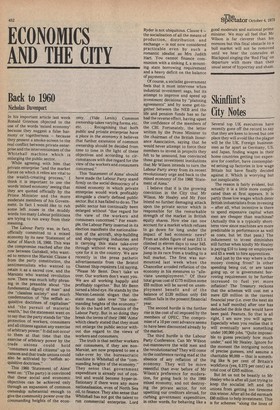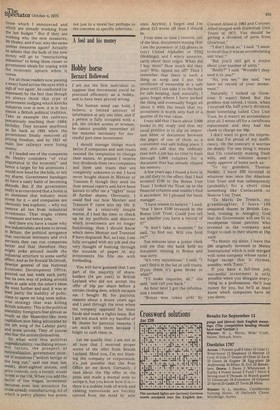Skinflint's City Notes
Several top UK executives have recently gone off the record to say that they are keen to invest but one place they will avoid like the plague will be the UK. Foreign businessmen as far apart as Germany, US, and Japan, finding wages in their home countries getting too expensive for comfort, have contemplated setting up factories in low wage Britain but have finally decided against it. Which is worrying but not inexplicable.
The reason is fairly evident, but actually it is a little more complicated than at first appears. It is partly those low wages which deter British industrialists from investing — after all, what incentive is there to spend expensive capital when men are cheaper than machines? (Actually this is a typically shortterm view since machines are more predictable in performance as well as costs, but let that pass.) The inducement to invest diminishes still further when kindly Mr Healey is paying £10 to keep on employees and £5 a week to hire apprentices.
And just by the way where is the money coming from? Is other spending being cut, or are taxes going up, or is government borrowing requirement to be further increased to fuel yet more inflation? The Treasury reckons that the schemes will cost net a mere £20 million in the current financial year (i.e. over the next six and a half months) after one has deducted the dole that would have been paid. Peanuts. So that is all right, I am sure you will agree.
Especially when you realise that it will eventually save something under 100,000 jobs. "Quite impossi ble to guess precisely how much under," said Mr Healey. Ignore for the moment the intriguing notion of precise guesses, and assume a charitable 90,000 — that is someth ing like % per cent of Britain's workforce (yes, 0.375 per cent) at a total cost of £205 million.
But let us not be beastly to Mr Healey who is after all just trying to keep the socialist left and the unions from getting too tiresome this winter. After all he did earmark £80 million to help investment. This is for schemes "along the lines of those which I announced and Which are already working from the last budget." But if they are working why the new measures, Mr Healey, and if not, why the same useless measures again? Actually he admits that the bulk of the new money will go to "restructuring industries" to bring them closer to government ideals for coping with the economic upturn when it comes.
For all those readers now passing a weary hand across the eyes with a sigh of 'not again', be comforted (or depressed) by the fact that though we always think this type of government nudging which knocks industries over is new, it is in fact almost a British political tradition. Take as example the railways Precariously reaching their 150th birthday. They became moribund as far back as 1894 when the government finally removed all Pricing freedom, and by 1921 all main line railways were losing money.
If I headed one of the companies Mr Healey considers "of vital importance to the economy" and hence a target for his attentions I would now head for the hills, or sell my shares. Government bandages do have a nasty habit of becoming shrouds. But if the government really is so convinced that a boom is so imminent that industry must invest for it — and companies are obviously less euphoric — why not remove all tax from industrial investment. That might create investment and -hence jobs.
And there you have a cause why few industrialists are keen to invest in Britain: the political arrogance that convinces ministers and civil servants they can run companies better and that therefore they might poke around inside the industrial structure to some useful effect. And as Sir Ronald McIntosh, director general of the National Economic Development Office, Pointed out last week each party has its own way of poking around quite at odds with the other's ideas. He went further and said it was at least partly the inability of politicians to agree on long term industrial strategy that was killing British industry. This is the political instability foreigners fear almost as much as the Mussolini-like state capitalism now being advocated by the left wing of the Labour party and some unions. They of course also fear the unions themselves. So what with this political unpredictability, vacillating economic tactics, the prospect of nationalisation, government interest in industries ("seldom benign in the long run," said one man last week), short-sighted unions, and price controls, only a lunatic would invest in the UK. When you add the factor of low wages, investment becomes even less attractive for those already manufacturing. All of which is pretty gloomy but points
not just to a moral but perhaps to the converse as specific solutions.



































 Previous page
Previous page